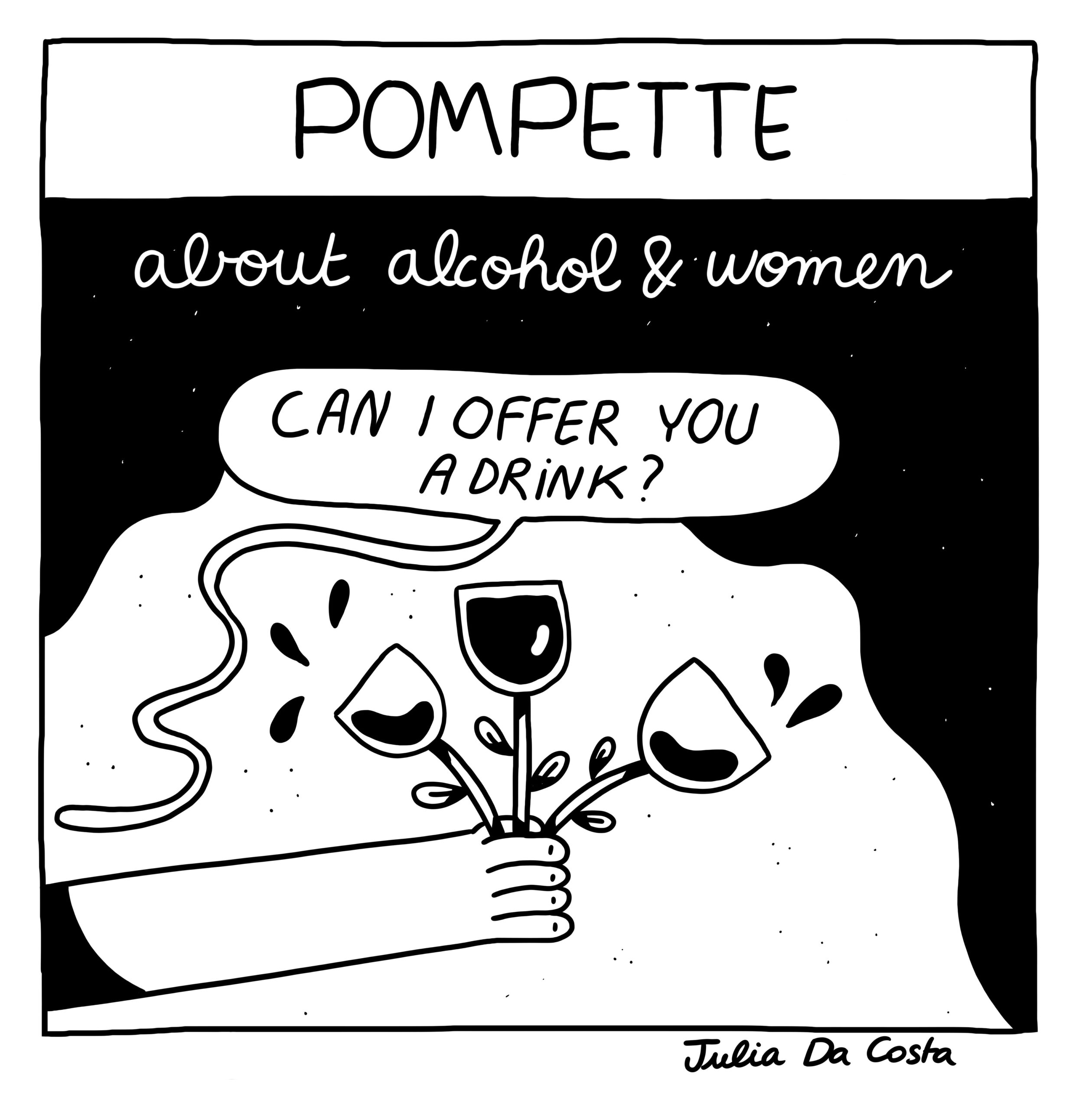Pompette – About Alcoholism
psycho club – Pompette – Julia da Costa
Psycho Club is a series of comics with mental health as the main theme. These publications aim to popularize various mental health topics, such as alcoholism, anxiety, depression, and relationships. Each publication contains a mini graphic novel and an explanatory text on the theme.
ABOUT
PSYCHO
CLUB
MENTAL HEALTH
Alcoholic diseases
Ethanol, present in alcohol, is the psychoactive substance responsible for the effects of alcoholic drinks. Two phases follow one another: first, there is disinhibition, psychic and motor excitement, the “tipsy” effect. After the sedation, you feel heavy and tired. if you repeat this behavior regularly and excessively, you risk settling into an alcoholic disease.
“Excessive use of alcoholic beverages, harmful to the mental or social health of the subject, whether or not associated with psychological or physical alcohol dependence.” (DSM-IV)



Alcoholic disease is the loss of the freedom not to drink (freedom to be sober), accompanied by medical, psychological and social complications (such as progressive de-socialization). It’s a multifactorial disease in terms of its causes, manifestations and effects. Its development and evolution are part of a continuum with strong individual variations. It’s a physical disease, which the person suffering from it undergoes. Alcohol is an anxiolitic that calms, relaxes and “softens” the mental load and stress.
“There is alcoholism when an individual has lost the freedom to refrain from drinking alcohol”. (Fouquet)
An obsession with alcohol (the urge to drink), signs of withdrawal, and craving (shaking, sweating) appear when you are not drinking. As the effect of alcohol gradually loses its strength, daily doses are increased to regain the effects of the first few times.
POMPETTE
Wine is good. It’s almost like grape juice, except it’s not. It’s a factor of social desirability, it’s an object considered valuable from a social point of view: drinking wine rather than beer seems classy. Wine improves our social image, it distinguishes us from others. We drink to be seen, to be accepted by a particular group to which we attribute a positive social value. Wine is a mean of social integration, it’s an exchange and a pleasure. It’s a tradition. But it’s also an addiction.
“Addicts are “slaves to quantity”” (McDougall, 2011)


Wine and female alcoholism
Media representation plays a significant role in shaping societal attitudes toward women who drink. The Media often perpetuates harmful stereotypes Women who drink are frequently depicted as irresponsible, promiscuous, and lacking in self-control, reinforcing negative perceptions and further marginalizing those struggling with addiction.
Furthermore, media representations contribute to gendered double standards surrounding alcohol consumption. While heavy drinking among men is often normalized and even celebrated, women who drink heavily are often condemned and labeled as deviant. Women who drink, whatever the situation, are judged a lot, mainly as immoral, less virtuous, less sophisticated, less rational. They are seen as more sexually open, it’s a social code for “I drink so I’m sexually available” (so I’m willing). Even through alcohol, we see how deeply rooted rape culture is in our society and in the social hierarchy. Addressing the social impact, the stigma surrounding alcoholic disease becomes pronounced when it comes to women.
A prevailing social taboo shrouds alcoholism, and the issue of women who drink is often sidestepped. Society tends to harshly judge women who consume alcohol, labeling them as less moral, less virtuous, less sophisticated, and less rational. The stereotypes extend further, associating female alcohol consumption with heightened sexual availability—a reflection of ingrained rape culture and social hierarchies.
The societal expectation of women as caregivers—attending to themselves, their husbands, children, and homes—intensifies the judgment. A woman who drinks disrupts the ingrained image of the nurturing figure, instantly labeled a bad mother or partner. She cannot fail in these roles. Faced with these societal pressures, women with alcohol addiction often grapple with heightened shame, leading them to conceal their consumption, bear their struggles in silence, and pretend as if nothing untoward has occurred.
Pompette – About Alcoholism
Alcoholism as a societal Taboo
The social dimension adds another layer of complexity. Society’s judgments and the attached stigma can heighten these symptoms, creating additional hurdles for individuals seeking assistance. It’s crucial to recognise that alcoholism is a complex issue with various causes and impacts. It’s not a person’s fault but rather a confluence of genetic, environmental, and psychological factors. Understanding this complexity is essential for effective intervention and support.
Breaking down societal stigma is essential to create an environment where individuals can seek help without undue blame. Acknowledging alcoholism as a mix of factors enables us to provide compassionate and comprehensive support, fostering a space of understanding and empathy in navigating the intricate landscape of alcohol-related struggles.
What can be done?
Healthcare disparities further compound the challenges faced by women with alcohol addiction. Gender bias in medical settings can result in underdiagnosis or misdiagnosis of alcohol-related problems in women, leading to inadequate treatment and support.
To address these disparities, one solution is to integrate gender-sensitive approaches into healthcare policies and practices. This includes training healthcare providers to recognize and address the specific needs of women with alcohol addiction and ensuring equitable access to gender-responsive treatment options.
Establishing supportive environments is critical for women seeking recovery from alcohol addiction. This involves creating safe spaces where women can share their experiences without fear of judgment or stigma. Peer support networks can also play a crucial role in providing encouragement, validation, and solidarity throughout the recovery process.
Pompette – About Alcoholism
Text and Illustration: Julia Da Costa
Pompette – About Alcoholism
psycho club – Pompette – Julia da Costa


